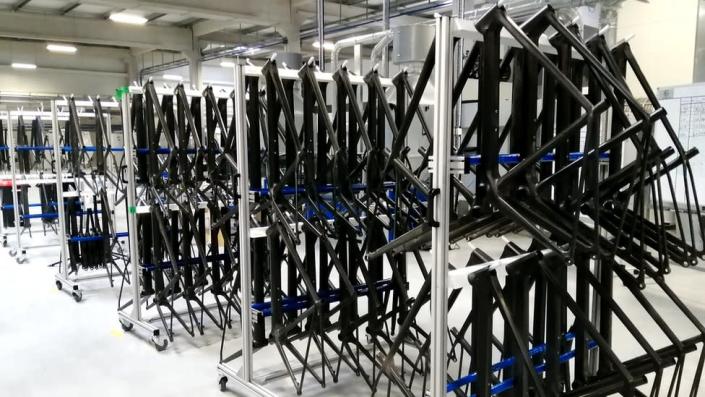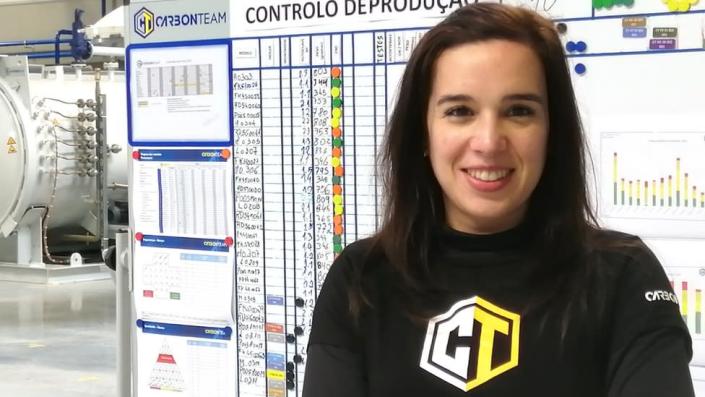
There is expanding demand from novice cyclists for far more reasonably priced, carbon fibre bicycle frames.
The material is light and potent, and between other issues fans hope it will make improvements to their pace.
In Portugal, Carbon Team and its investors are betting on this urge for food for large-end bikes growing in Europe.
Positioned in Campia (not far from Oliveira de Frades, a town popular for bikes), a team of investors from Portugal, Germany, and Taiwan launched the organization in 2018.
The business feel manufacturing of hello-tech bicycle parts is poised to return to Europe, soon after decades of offer from corporations in China and Taiwan.
Emre Ozgunes joined Carbon Group in 2019, hired as a typical manager for the new corporation right after yrs of encounter in the Portuguese bike sector.
At first from Turkey, he worked as a factory floor staff in a bicycle organization in central Portugal, where by he figured out the trade.
“I often yearned to start a small business from scratch”, Mr Ozgunes tells the BBC.

The investors set €8.4m (£7m $9.2m) into Carbon Group and just after three several years of products growth, manufacturing begun very last calendar year.
Just a few folks staffed that to start with production line: Mr Ozgunes, Miguel Oliveira, the company’s generation manager, and Filipa Antunes, now technical manager.
By March of this yr output had amplified – with 30 workers setting up amongst 8 and 10 frames for each day.
Mr Ozgunes hopes that by 2023 they will have almost 200 people on Carbon Team’s payroll, making up to 150 frames for each day.
Even though it is really a prolonged way off, expansion to this size would make Carbon Crew the only corporation in Europe to mass produce carbon fibre frames. Just about all the frames will be exported.
If need genuinely will take off, there is land readily available guiding the manufacturing unit where by they could establish an further unit and double most potential to 110,000 frames for each yr.
There is a wider development getting attractiveness among the European industries to relocate crucial features of their source chain nearer to household, restricting their dependency on Asian suppliers for parts and raw products.
The Covid-19 pandemic accelerated this pattern. Freight selling prices skyrocketed and lockdowns compelled a lot of Asian factories to sporadically suspend their generation.
The Confederation of the European Bicycle Field (Conebi) estimates that amid all bicycles sold in Europe, 40% of their pieces are manufactured on the continent, growing to additional than fifty percent for electric bikes.
“This is favourable, but there is still the want to have extra manufacturing of parts in Europe,” suggests Manuel Marsilio, common supervisor of Conebi.
“The supply chain disruptions in the bicycle business have boosted discussions that started currently right before the pandemic. Creating parts nearer to in which bicycles and e-bikes are assembled has several rewards and the field is likely to go in that way,” he adds.
The field is currently debating how to velocity-up this change – but it will be a sluggish changeover.
The hottest World-wide Bicycle & Bicycle Extras Market place report by consultancy agency, PwC, shows that more than half of European bicycle companies purchase their frames on the intercontinental marketplaces.
Marta Baldin, from PwC’s Italian department and co-writer of the analyze, tells the BBC, that “in the in close proximity to long run, provide from overseas is not expected to decrease or sluggish down. It is anticipated that the major focus of imports will nevertheless come from Asian marketplaces”.
Far more technological innovation of small business:
Analysts propose the most important opportunity for European firms lies at the higher close of the market.
“On quality and innovation, EU producers do not endure from overseas competition and this is the key cause why market and large-excellent bike goods are however made in the EU,” she provides.
And as wages increase for manufacturing facility workers in Asia, purchasing from that location is losing some of its financial advantage. In the meantime, freight costs are more and more prohibitive, points out Mr Ozgunes.
Volatility on intercontinental commodities marketplaces is also encouraging Carbon Crew at the instant.
The price tag of aluminium, for instance, typically the less expensive choice to carbon fibre, soared to record degrees in March before relocating reduce.
Although carbon fibre charges have risen as nicely, the enhance is currently nowhere around the increase in aluminium rates.
This inflationary craze will possible have an effect on the cost of mid-selection bicycles way too, in accordance to Mr Ozgunes.

On the factory floor, Carbon Team’s staff members target silently on their duties, all demanding precision. A group of staff applies carbon fibre to moulds. Other people, on separate tables, prepare and test the raw substance.
In a individual aisle, four huge ovens bake the ultimate solution, even though just lately created frames are analyzed for quality and protection.
Filipa Antunes, Carbon Team’s complex supervisor, joined in February 2020, just one month ahead of the onset of the pandemic.
“Demand for two-wheeled automobiles rose exponentially with the pandemic and luckily for us several corporations constructed up their potential,” she claims.
She is optimistic and thinks the proposed expansion promises a dazzling foreseeable future for her and her business.




